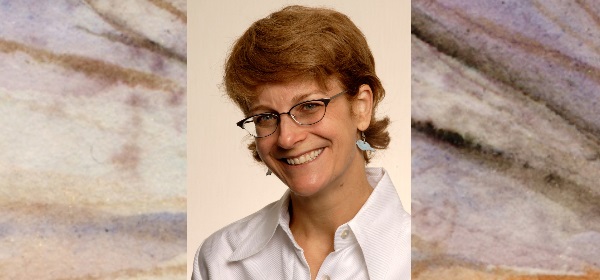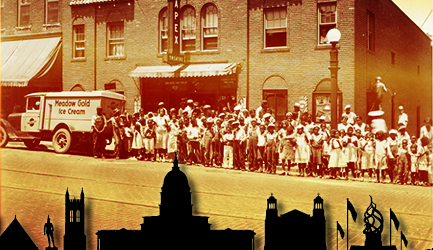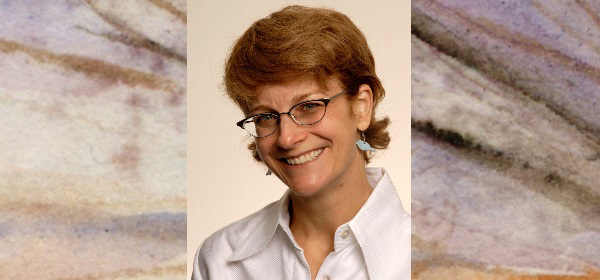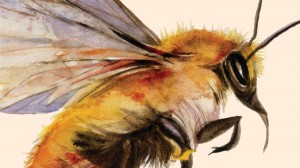Otherworldly Fiction: Kij Johnson

Kij Johnson is a Science Fiction superstar. I first encountered her work while reading my way through the library's Nebula Awards Showcase collections. Johnson's work is included in a number of them, and she edited the 2014 collection.
After reading the startling and unforgettable stories "Ponies" and "Spar," I was hooked. I devoured her first short story collection, At the Mouth of the River of Bees, soon after. These are stories of magic, animals, and future landscapes that transport us into a different reality. In the tradition of magical realism, the otherworldly aspects of Johnson's stories are often paired with every day moments, and are presented without explanations. We are immersed in her world.
It was only when I came to the end of this collection and read the author's biography that I realized I was reading the work of a neighbor--Kij Johnson lives in Lawrence, Kansas, and is an Associate Professor of Fiction for the University of Kansas.
Jaw drop!
Kij Johnson came to Kansas because of science fiction great James Gunn, a Kansas City native and KU graduate. She attended Gunn's Intensive Science Fiction and Fantasy Workshop one summer, and kept coming back to learn more. She was drawn by the land itself, too.
"Lawrence in June and July is beautiful," Johnson said, "and I fell in love with the town and the summers here."
Johnson recognizes that the landscape of the Midwest has influenced her writing, even if she's not actually writing work set here.
"I hardly ever write about Iowa or the plains, but they gave me a great love of landscape that I do write about: big landscape but also the small, unglamorous aspects: broken fossils in a riverbank, the smell of two-stroke oil from an old lawn mower. I returned to the plains because I need big skies."
Check out the work of Kij Johnson from your library, and discover other fantastic writers on our Sci-Fi and Fantasy shelves.Read on for an original interview with Kij Johnson.
-----------------------------------------------------------------------------------------------------------------------------
An Interview with Kij Johnson
You have been assisting with short fiction workshops at KU since 1996, taught your first solo workshop in 2005, and became an Assistant Professor of Fiction Writing in 2012. Your website says that you split your time between the West Coast and the Midwest. How did you end up living and working in Kansas? Has the Kansas landscape or culture influenced your writing?
I ended up in Kansas because of KU professor emeritus James Gunn. He taught that first workshop I attended in 1994, and he was such a great workshop leader and critic that I kept coming back and learning something new every time. For most of the time, I lived in Seattle, but Lawrence in June and July is beautiful, and I fell in love with the town and the summers here. I lived here full-time for a few years (2002-2005), moved back to Seattle and then to North Carolina for grad school, but I was here almost every summer, and when the chance of working at KU came up, I was delighted.
I am still becoming familiar with Kansas culture but I am familiar with the plains, since I grew up in a small town in farm country in Iowa, pigs and soybeans mostly. I hardly ever write about Iowa or the plains, but they gave me a great love of landscape that I do write about: big landscape but also the small, unglamorous aspects: broken fossils in a riverbank, the smell of two-stroke oil from an old lawn mower. I returned to the plains because I need big skies.
You worked as a managing editor for Tor Books, and as a collections and special editions editor for Dark Horse Comics. Has working as an editor changed the way that you write, or given you any insight on submitting your work for publication?
Most of my “editorial” work was as a managing editor or a production editor: I was responsible for turning an manuscript that had been accepted by another editor into a published book, but I did, in the early days, work on small-press magazines. The best part of editing (as opposed to production) was that it taught me to read impatiently. I was looking for a reason to dislike a story, because if I disliked it I wouldn’t have to finish reading it, and I could move on to the next story in the stack.
This is often the way readers read: sometimes they finish a story because they have paid money for it, or because they feel they ought to for one reason or another, but a lot of people won’t bother finishing a dull story. A problem with writing programs is that everyone reads everything all the way through -- that’s their responsibility as workshoppers -- and as writers they don’t learn to read their own (or others’) work as impatiently as a reader might.
The production positions gave me a profound understanding of the structure of a story. Comics’ story structure was based in part on the characteristics of a 32-page paper, four-color book, which led me to think a lot about the structure of other stories.
I played a lot of Magic: The Gathering during the '90's, and recently introduced the game to my son, so I was excited to see that you spent some time working for Wizards of the Coast. Tell us a bit about your work for Wizards, and your role in MTG. Have you ever played the game?
I played a LOT of Magic! Mostly white decks and red/white and white/artifact. I had an enormous collection of cards from Beta through The Dark, when I started working there. I had a series of interesting jobs there: I worked on nonfiction books about Magic; online games about Magic and Battletech; R&D on massive multi-user Magic (which we didn’t pursue at the time); and Magic continuity. When we bought TSR, I moved to Dungeons and Dragons, where I was creative director of Greyhawk and then Forgotten Realms. It was fun and challenging -- the best sort of job there is.
Your novels The Fox Woman and Fudoki describe the clothing, housing, and customs of ancient Japan in detail, reflecting your intensive research. I read that you are planning a third novel set in Heian Japan, and were able to spend several weeks in Japan for research. Did you spend your time in libraries, or travel the countryside? Did you take a lot of notes and photos, or just immerse yourself in the culture?
This third book is far from any center of high culture, either now or back in the 8-9th century, when it is set. I spent some time in Kyoto, mostly walking through lesser-known shrines and parks, but the majority of my time was in small towns farther north. Again, I walked a lot and took thousands of pictures of small things like foliage and bark textures. Since the book is set in the winter, I visited in February. It was a snowy one. I had wanted to hike on one mountain in the far north, Osorezan, but couldn’t even get to the small town I was going to use as a starting point. So I’ll have to go back!
Many of your stories focus on human relationships with animals, and your work reveals an interest in canids, in particular. Do you have pets? Do you hope to communicate a message about animals through your fiction?
I have a cat now, a small and very charming elderly lady named Vellit. She was a rescue and already quite old when I got her; she has cancer and I don't expect I will have her here for much longer, alas. I've had three rescue dogs, sheltie Bertie, German shepherd Syd (the inspiration for "At the Mouth of the River of Bees"), and collie Hope, and several cats, including Tatsuko who was the model for the tortoiseshell in Fudoki and The Cat Who Walked a Thousand Miles.
I have a lot of things I want to say about animals in my fiction, but at its heart, I think I want people to recognize their essential Otherness. They exist independent of us and our perceptions and assumptions about them. When we engage with animals, we are attempting to cross an unbridgeable gap, and the question is how close can we get? The gap between us and dogs is the smallest one, so I keep coming back to them.
How did the MFA program at North Carolina State University strengthen your writing? What is your advice for a writer who is considering an MFA degree?
NC State has great instructors who understood the fantasy and formalist work I was trying to do, which meant that they didn’t let me get away with much! I worked with students working in genres I had no familiarity with, and that gave me an appreciation of genres I had always discounted as dull or sensational, and that gave me some new tools I could apply to my own writing.
My number-one piece of advice for young people considering MFAs is to take some time between undergraduate and graduate school. If you have never done anything but be in school and be a writer, then your database of experience and empathy is limited: you can extrapolate from that small database, but it’s not as good as having a larger one in the first place. Take a couple of years off and keep writing, and see where you are at 24.
Does your work with writing students at the University of Kansas fuel your own creativity? What do you enjoy most about the job?
It’s been great fun. It hasn’t changed what I write (so far), but it has helped me formalize my thoughts about what I do write. I taught a graduate seminar on nontraditional narrative forms this spring; I was writing a lot of experimental and formalist pieces, and working with other people exploring it gave me new insights into how formalist fiction works, and when it does (or doesn’t).
Can you give us a little hint about what writing we’ll see from you next?
"The Apartment Dweller's Bestiary" came out online last year at Clarkesworld. It's a very short work that--well, it’s hard to describe. It’s a mythical bestiary, of course and it’s an experiment in second-person narrative.
I spent some years working on a long, very ambitious novel that I finished last summer and have shelved for a while. Immediately afterward, I wrote something totally different, a sort-of sequel to Kenneth Grahame's The Wind in the Willows. It will be coming out from Small Beer Press either late next year or early the year after. I have also just finished a new novel that has nothing whatsoever to do with SF or fantasy -- I am still tweaking it and trying to decide what to do with it!
How can readers find out more about you and follow your work?
My website, www.kijjohnson.com, is full of stories and poems, and has links to even more. I have a Facebook page, as well: Kij Johnson. I love hearing from people who read what I write! Thanks for the chance to talk about my work.














